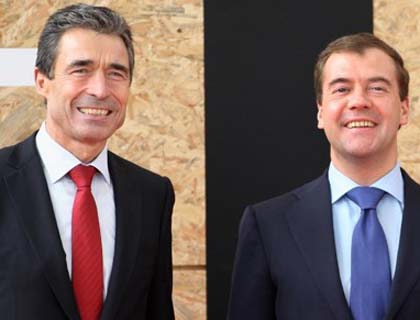SOCHI, Russia— Differences over the war in Libya and missile defense plans are hindering efforts to build a strategic partnership between NATO and Russia, Russia's foreign minister said Monday.
"The dialogue is not proceeding as easily as we expected after the Lisbon summit," Sergey Lavrov said, referring to the meeting of Russia's and NATO's heads of state in the Portuguese capital in November, when the former Cold War rivals decided to forge a close partnership.
NATO Secretary-General Anders Fogh Rasmussen acknowledged the differences but insisted that "the spirit of Lisbon lives on and continues to guide us. Cooperation is the best choice, partnership is the only path forward."
Envoys from Russia and the alliance's 28 members were in the resort city of Sochi for a meeting of the NATO-Russia Council, which normally meets at NATO's headquarters in Brussels.
Russia abstained in the U.N. vote on Libya and has voiced concern about civilian casualties and excessive use of force since the NATO-led air campaign against Moammar Gadhafi's military facilities began in March.
"Since NATO started to execute the U.N. resolution ... we have discussed how strongly international law has been respected," Lavrov told journalists.
He again criticized France for dropping weapons to the Libyan opposition fighting Gadhafi's forces, saying the move was a violation of a U.N. embargo on supplying weapons to any part of Libya.
Fogh Rasmussen insisted that NATO has been acting in strict conformity with U.N. decisions. "We intend to continue our operations until the resolution is fully implemented," he added.
Commenting on the French weapons supplies, Fogh Rasmussen said "the delivery of weapons has not taken place in the NATO operation" and was aimed at "the protection of civilians and their ability to protect themselves."
Monday's Russia-NATO meeting was also attended by South African President Jacob Zuma, who told participants about the African Union's efforts to help negotiate a peaceful settlement in Libya.
At a news conference after the talks, Fogh Rasmussen said any cease-fire must be credible and verifiable and that a peaceful solution "must accommodate the legitimate aspirations of the Libyan people."
"It is for the Libyan people to shape the future of their country. The mission we are conducting aims at meeting very specific military objectives," the NATO chief said when asked if Gadhafi should stay in office. "The only acceptable solution is to accommodate the legit aspirations of the Libyan people and see a transition to a fully fledged democracy."
Lavrov and Fogh Rasmussen also said differences remained with NATO over a proposed missile-defense system in Europe.
"Many key issues need to be addressed. We never said we would agree on ballistic missile defense in a few weeks or months," Fogh Rasmussen said. "But we are determined to keep up the dialogue."
Russia is demanding to jointly run the system, while the United States and NATO are offering Moscow a more limited role. Experts from both sides are scheduled to report this month on details of the proposal.
Rasmussen said the military alliance and Russia must build on their cooperation in the Afghan war and the fight against maritime piracy to create a solid strategic partnership.
Relations between NATO and Russia have roller-coastered over the past decade, reaching a high point after the September 2001 terrorist attacks, then hitting rock-bottom following the 2008 Russian-Georgian war, when the alliance froze relations with Moscow.
Under President Barack Obama's resetting of ties with Russia, Moscow has agreed to allow NATO to ship military supplies to Afghanistan through its territory, and has cooperated in anti-piracy patrols off the Somali coast. Russian forces have also trained with NATO in anti-terrorism and naval exercises.
In addition, Russia has supported U.N. sanctions against Iran and signed the New START treaty with the U.S. reducing the ceiling on both countries' nuclear arsenals. (AP)

